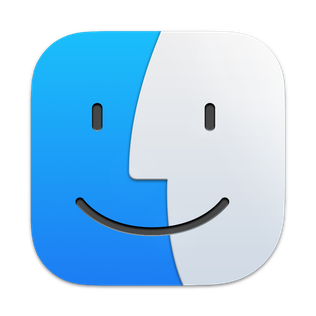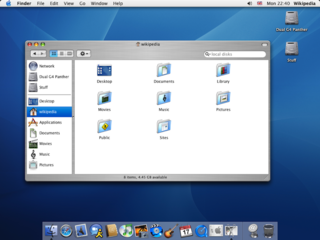Related Research Articles
New Technology File System (NTFS) is a proprietary journaling file system developed by Microsoft. Starting with Windows NT 3.1, it is the default file system of the Windows NT family. It superseded File Allocation Table (FAT) as the preferred filesystem on Windows and is supported in Linux and BSD as well. NTFS reading and writing support is provided using a free and open-source kernel implementation known as NTFS3 in Linux and the NTFS-3G driver in BSD. By using the convert command, Windows can convert FAT32/16/12 into NTFS without the need to rewrite all files. NTFS uses several files typically hidden from the user to store metadata about other files stored on the drive which can help improve speed and performance when reading data. Unlike FAT and High Performance File System (HPFS), NTFS supports access control lists (ACLs), filesystem encryption, transparent compression, sparse files and file system journaling. NTFS also supports shadow copy to allow backups of a system while it is running, but the functionality of the shadow copies varies between different versions of Windows.

The Finder is the default file manager and graphical user interface shell used on all Macintosh operating systems. Described in its "About" window as "The Macintosh Desktop Experience", it is responsible for the launching of other applications, and for the overall user management of files, disks, and network volumes. It was introduced with the first Macintosh computer, and also exists as part of GS/OS on the Apple IIGS. It was rewritten completely with the release of Mac OS X in 2001.

Mac OS X Panther is the fourth major release of macOS, Apple's desktop and server operating system. It followed Mac OS X Jaguar and preceded Mac OS X Tiger. It was released on October 24, 2003, with the retail price of US$129 for a single user and US$199 for a five user, family license.
Utility software is software designed to help analyze, configure, optimize or maintain a computer. It is used to support the computer infrastructure - in contrast to application software, which is aimed at directly performing tasks that benefit ordinary users. However, utilities often form part of the application systems. For example, a batch job may run user-written code to update a database and may then include a step that runs a utility to back up the database, or a job may run a utility to compress a disk before copying files.
HFS Plus or HFS+ is a journaling file system developed by Apple Inc. It replaced the Hierarchical File System (HFS) as the primary file system of Apple computers with the 1998 release of Mac OS 8.1. HFS+ continued as the primary Mac OS X file system until it was itself replaced with the Apple File System (APFS), released with macOS High Sierra in 2017. HFS+ is also one of the formats supported by the iPod digital music player.
The following tables compare general and technical information for a number of notable file managers.

Windows Live Mesh is a discontinued free-to-use Internet-based file synchronization application by Microsoft designed to allow files and folders between two or more computers to be in sync with each other on Windows and Mac OS X computers or the Web via SkyDrive. Windows Live Mesh also enabled remote desktop access via the Internet.

Time Machine is the backup mechanism of macOS, the desktop operating system developed by Apple. The software is designed to work with both local storage devices and network-attached disks, and is most commonly used with external disk drives connected using either USB or Thunderbolt. It was first introduced in Mac OS X 10.5 Leopard, which appeared in October 2007 and incrementally refined in subsequent releases of macOS. Time Machine was revamped in macOS 11 Big Sur to support APFS, thereby enabling "faster, more compact, and more reliable backups" than were possible previously.
The NTFS file system defines various ways to redirect files and folders, e.g., to make a file point to another file or its contents without making a copy of it. The object being pointed to is called the target. Such file is called a hard or symbolic link depending on a way it's stored on the filesystem.

In computing, the trash is a graphical user interface desktop metaphor for temporary storage for files set aside by the user for deletion, but not yet permanently erased. The concept and name is part of Mac operating systems, a similar implementation is called the Recycle Bin in Microsoft Windows, and other operating systems use other names.

Microsoft OneDrive is a file hosting service operated by Microsoft. First launched in August 2007, it enables registered users to share and synchronize their files. OneDrive also works as the storage backend of the web version of Microsoft Office. OneDrive offers 5 GB of storage space free of charge, with 100 GB, 1 TB, and 6 TB storage options available either separately or with Microsoft 365 subscriptions.
MobileMe is a discontinued subscription-based collection of online services and software offered by Apple Inc. All services were gradually transitioned to and eventually replaced by the free iCloud, and MobileMe ceased on June 30, 2012, with transfers to iCloud being available until July 31, 2012, or data being available for download until that date, when the site finally closed completely. On that date all data was deleted, and email addresses of accounts not transferred to iCloud were marked as unused.
This is a comparison of online backup services.

DaisyDisk is a paid disk space analyzer for macOS. It displays a sunburst diagram of files on a hard drive to help with the location or deletion of large files. It can display previews of files using Quick Look. It also allows the user to look at the file directly in Finder, in order to delete it or move it elsewhere.

SpaceSniffer is a freeware computer disk space analyser from Uderzo Software for Microsoft Windows platforms. It uses a treemap to visualise disk usage.

CleanGenius is utility software for Apple Inc.'s macOS. It is used to clean the potentially unneeded files on the macOS startup disk, uninstall the application by removing its core files, preference files, cache files and proper support files. This software includes the direct version on EaseUS official website and the App Store version in Apple Inc.'s Mac App Store

IDrive Inc. is a technology company that specializes in data backup applications. Its flagship product is IDrive, an online backup service available to Windows, Mac, Linux, iOS and Android users.
A disk utility is a utility program that allows a user to perform various functions on a computer disk, such as disk partitioning and logical volume management, as well as multiple smaller tasks such as changing drive letters and other mount points, renaming volumes, disk checking, and disk formatting, which are otherwise handled separately by multiple other built-in commands. Each operating system (OS) has its own basic disk utility, and there are also separate programs which can recognize and adjust the different filesystems of multiple OSes. Types of disk utilities include disk checkers, disk cleaners and disk space analyzers

Mac OS is the series of operating systems developed for the Macintosh family of personal computers by Apple Computer from 1984 to 2001, starting with System 1 and ending with Mac OS 9. The Macintosh operating system is credited with having popularized the graphical user interface concept. It was included with every Macintosh that was sold during the era in which it was developed, and many updates to the system software were done in conjunction with the introduction of new Macintosh systems.
References
- ↑ Space Gremlin 1.2 update released
- ↑ "Space Gremlin helps you free up hard drive space on your Mac". TUAW. Retrieved 2011-02-14.
- ↑ Bruls, Mark; Huizing, Kees; van Wijk, Jarke J. (2000), "Squarified treemaps", in de Leeuw, W.; van Liere, R. (eds.), Data Visualization 2000: Proc. Joint Eurographics and IEEE TCVG Symp. on Visualization (PDF), Springer-Verlag, pp. 33–42.
- ↑ "Space Gremlin Features".
- ↑ "Space Gremlin Is A Simple App To Free Up Space On Your Mac".